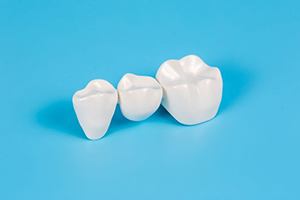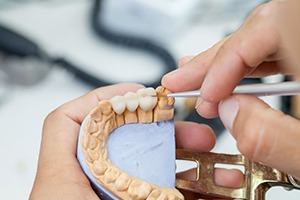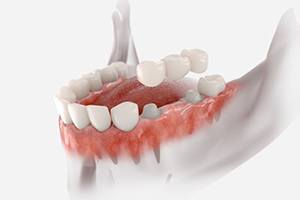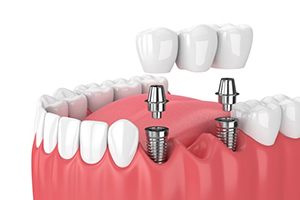
Dental Bridges – East Hartford, CT
Efficient, Reliable Tooth Replacement

If you have lost one or more teeth, you may be in the process of considering your tooth replacement options. Here at Comprehensive Dental Associates of Central Connecticut in East Hartford, we offer a number of efficient, reliable tooth replacement methods, including dental bridges. They are strong, long-lasting, and have the potential to look incredibly lifelike. Read this page to learn more about them, and get in touch with us when you are ready to book your restorative consultation.
Why Choose Comprehensive Dental Associates of Central Connecticut for Dental Bridges?
- Lifelike Materials Available
- Highly Skilled Dental Team
- Long-Lasting Results
What Is a Dental Bridge?

A dental bridge is a form of tooth replacement that is meant to address mild to moderate tooth loss. Usually, they can replace 1 – 3 teeth. A traditional bridge has two crowns, which get fitted on the abutment teeth (the teeth adjacent to an empty space). Between the crowns, one or more pontics (artificial teeth) “bridge” the gap to complete the patient’s smile.
Bridges are often ideal for patients who have lost one or more teeth and who are interested in an efficient, cost-effective way to replace their lost dentition.
Types of Dental Bridges

When you visit us for your consultation, we will carefully evaluate your situation before we plan the details of your treatment. We often recommend traditional bridges, but for many patients, an implant bridge is the superior option. Which one is right for you? Our team will help you weigh the pros and cons of each option so you can make a well-informed decision about how to move forward.
Traditional Bridge

A traditional dental bridge is an efficient treatment that takes just a few appointments to complete. These restorations are both sturdy and durable. They are also relatively cost-effective. Their biggest downside is that they require the abutment teeth to be significantly — and permanently — modified.
Implant Bridge

Instead of relying on the abutment teeth for support, an implant bridge is held in place via prosthetic tooth roots (dental implants). Therefore, there is no need to modify the abutment teeth. Dental implants are also excellent for the long-term health of the jawbone. The drawback to implant bridges is that the treatment process requires more time and money.
The Benefits of Dental Bridges

A dental bridge may deliver several benefits:
- It can act as a placeholder that prevents the remaining natural teeth from drifting out of place.
- You may feel more confident with a complete smile.
- A bridge can make it much easier to enjoy all of your favorite foods.
- By enabling you to eat comfortably on both sides of your mouth, a bridge can support the health of your jaw and facial muscles.
Would you like to learn more about dental bridges? Our team is ready to answer your questions! Get in touch with us to book a consultation today.